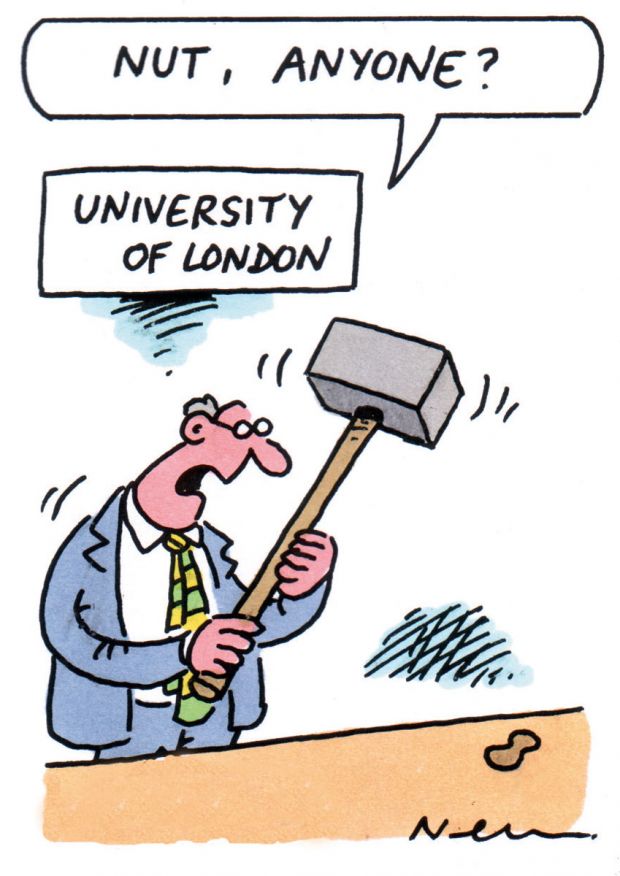
- The worst-kept secret in politics is finally out; education secretary Michael Gove wants to get his hands on universities. Having already forced his way into higher education by asking universities to oversee A levels, Mr Gove finally came clean about his full ambitions to expand his ministerial empire in a Financial Times interview on 15 March. Asked what he would like to do next, Mr Gove replied: “What I’d really like to do is this job, plus universities.” He added: “I think that universities and science should be in this department.” With Mr Gove making no secret of his preference for Russell Group universities and Oxbridge traditions, his determination to wrest higher education away from Vince Cable’s business department will send a chill through some of the sector’s newer universities.
- How on earth did the University of London spend £810 on cleaning some chalk off its foundation stone? That was the question posed by 49 academics who penned an open letter after student protester Konstancja Duff, 25, was convicted of criminal damage and ordered to reimburse the university for the cost of removing her chalk slogans in support of outsourced cleaners. Alongside the letter, the scholars enclosed some cleaning cloths with instructions on how chalk writing could be removed more cheaply. “Applied in gentle circular motions to the affected area, you’ll find it wonderfully efficient in removing unwanted chalk marks, leaving the material beneath clean and fresh,” the letter states. According to the university, much of the cost incurred related to the destruction of gold leaf lettering during the “high-pressure hydro-cleaning”, a course of action also likely to bemuse academics.
- The BBC has apologised to the London School of Economics for a “serious failing” over its use of a student trip to North Korea as a cover for secret filming. Students were kept in the dark about the risks of allowing Panorama reporter John Sweeney and a cameraman to join a student society trip to the communist state, according to a damning report by the BBC Trust. Students were informed that a journalist would be joining the trip during a meeting in a London pub, but that fell well short of an “informed discussion about the risks of the trip and whether they were worth taking”, the report says. The BBC had no exit plan for the students, who were unaware that Mr Sweeney and his team would separate from the group if detected, the trust adds. The use of an LSE address on a visa application for Mr Sweeney was also “inappropriate”.
- The resignations of several Russell Group vice-chancellors may be linked to growing pressure on higher education leaders to justify their high salaries, The Times claimed on 14 March. With the Thunderer now leading the boos and catcalls against “fat cat” pay awards to university leaders, it impishly suggested that the “retirements” of several prominent university leaders announced recently may have been hastened by their governing councils. That trend may be accelerated by new draft guidance from the Committee of University Chairs, which “urges them to become more effective at challenging leaders of their institutions”, The Times said. After 2012’s “shareholder spring” toppled several chief executives and put the brakes on bosses’ pay, perhaps the high-pay awakening has finally reached higher education.
- The Queen’s visit to Royal Holloway, University of London caused an unlikely rumpus after she used the occasion to speak on behalf of the world’s poor, The Daily Mirror reported on 14 March. Making a rare political statement, the monarch remarked that “poor people and their problems don’t get reported often, and they need all the assistance they can be given”, the paper said. It arose in a conversation with David Simon, professor of development geography, who had explained his work with poor people, particularly in Africa. Her comments, however, were branded “crass and inappropriate” by the anti-monarchist group Republic, who pointed out she was “a multi-millionaire many times over and has no problems helping herself to public money”, although many more saluted what they saw as an admirable sympathy for the less well-off.
Register to continue
Why register?
- Registration is free and only takes a moment
- Once registered, you can read 3 articles a month
- Sign up for our newsletter
Subscribe
Or subscribe for unlimited access to:
- Unlimited access to news, views, insights & reviews
- Digital editions
- Digital access to THE’s university and college rankings analysis
Already registered or a current subscriber?
Please or to read this article.
